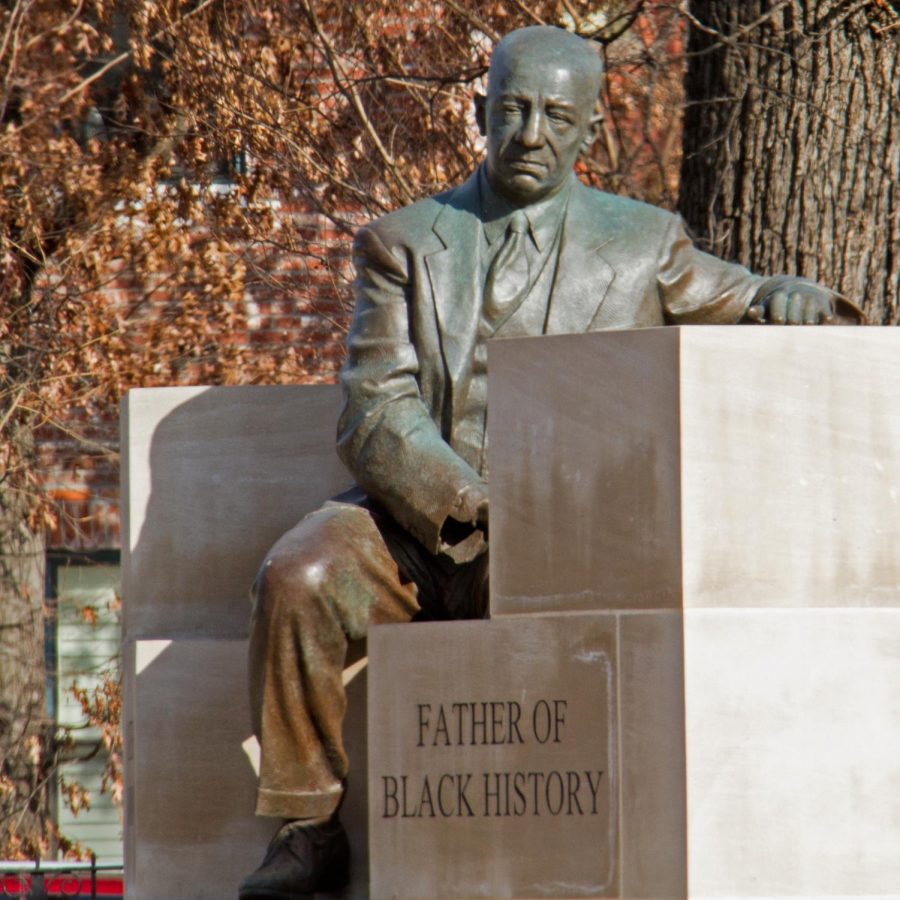Carter G. Woodson: Founder of Black History Month
February 10, 2021
In the month of February, people throughout the country acknowledge and celebrate the various contributions of African Americans to history. During Black History Month, everyone has the opportunity to appreciate a side of history that is often overlooked or misrepresented. What many people don’t know, however, is how this holiday originated. Dr. Carter G. Woodson, a scholar, educator, and journalist, was at the heart of founding Black History Month. Dr. Woodson accomplished much in his lifetime, and he is remembered for his attempts to improve society.
Early Life:
Carter Woodson was born on December 19, 1875 to parents Anne and James Goodson. Both parents were unable to read and write, and therefore, they were unable to teach these skills to their children. In addition, Carter Woodson spent most of his childhood working on a farm to support his family, so he was unable to attend school like other children. Despite this, Carter Woodson’s intellect could not be restrained. For the first seventeen years of his life, Woodson studied diligently, and he was able to teach himself all of the necessary skills that are typically taught at school.
At just seventeen years old, Carter G. Woodson moved to Huntington, West Virginia with his brother in order to attend Douglas High School. Carter spent his first years in Huntington mining to financially support himself, so he was unable to attend school during this time. At the age of twenty, Woodson was finally able to enroll at Douglas High School. He finished his highschool courses in only two years.
Higher Education:
After teaching in West Virginia from 1897-1900, Carter G. Woodson earned his bachelor’s degree at Berea College, Kentucky. After that, he continued his teaching career, and he continued his education. In this time, he travelled throughout Europe and Asia – becoming a school supervisor in the Philippines and studying at the Sorbonne University in Paris. In 1908, he received his master’s degree, as well as two more bachelor’s degrees, at the University of Chicago.
Lastly, Carter Woodson earned a Ph.D. at Harvard University in 1912 – making him only the second African American to receive a Ph.D at this university. Dr. Woodson, after spending so long in the American education system, would notice injustices that would define the rest of his career.
Honoring Black History:
Early on in his career, Dr. Woodson realized that American public schools often teach African American history inaccurately. Understanding the dangers teaching children a prejudiced version of history, Woodson decided to take action. In 1915, he founded what is now called the Association for the Study of Afro-American Life and History (ASALH). The purpose of this group was to preserve the legacy of African Americans through US history. Numerous times, the organization took direct action to combat the underlying racism in American society. In 1926, the ASALH established the Negro History Week for the second week of February – a precursor to Black History Month. Dr. Woodson held a firm belief that including African Americans in the discussion of history will ultimately result in society becoming less hateful and prejudiced.
In 1936, Dr. Mary McLeod Bethune, then president of the ASALH, suggested that they publish a journal to commemorate significant people and events in African American history. As a result, the ASALH published “The Negro History Bulletin,” now published under the name “The Black History Bulletin.” The magazine was released monthly, and it is still published by the ASALH today. “The Black History Bulletin” is targeted directly towards students, and it allows teachers to have complete lessons about accurately documented African American history. As a result, children around the country are able to learn about black history in a way that a normal school curriculum does not allow.
Lasting Impact:
Dr. Woodson started a tradition of documenting and publishing black history. Even today, using journalism to spread knowledge of African American culture and history is vital – as schools still tend to overlook black history. By focusing journalism on a part of history that is too often neglected, our society can develop a kinder understanding of all people. In addition, Black History Month remains a significant celebration in the United States, and it has even spread to other countries. Every year, people have the opportunity to learn more about the contributions of black individuals to society. These developments continue to make the world a better place. As Dr. Woodson himself observed, “We should emphasize not Negro history, but the Negro in history. What we need is not a history of selected races or nations, but the history of the world void of national bias, race hate and religious prejudice.”
Information Gathered From:
https://www.28daysofblackhistory.com/
https://www.berea.edu/cgwc/carter-godwin-woodson/
https://www.naacp.org/naacp-history-carter-g-woodson/












beuford • Mar 30, 2023 at 9:04 am
this was very accurate and you clearly put in a lot of hard work piecing all of the information together because it was difficult for me to find authentic information in order, good job & thank you!